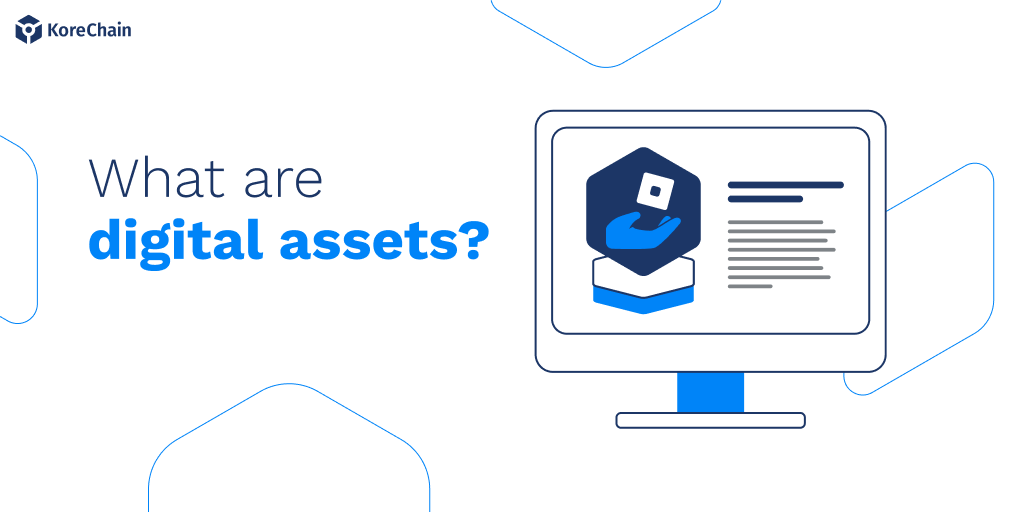In the ever-evolving landscape of finance and technology, digital assets have emerged as a transformative force, reshaping how we perceive and manage ownership and value. Digital assets represent a broad category of assets that are digitized and stored on blockchain technology, providing unprecedented security, transparency, and accessibility.
Keep reading and learn more.
TABLE OF CONTENTS
What Are Digital Assets?
Digital assets, in essence, are assets that exist in a digital form, represented and secured by cryptographic technology, often on a blockchain. These assets can represent various forms of value, including ownership, rights, or entitlements to physical or digital assets. Digital assets are versatile and can encompass a wide range of items, from financial instruments to intellectual property and more.
5 examples that you need to know
The table below categorizes and describes various types, such as Cryptocurrencies, Security Tokens, NFTs, and others, providing a clear and concise overview of this dynamic field.
| Asset | Description |
|---|---|
| Cryptocurrencies | Cryptocurrencies like Bitcoin and Ethereum are perhaps the most well-known digital assets. They represent units of value and are used as a medium of exchange on their respective blockchains. |
| Security Tokens | These represent ownership in traditional financial instruments, such as stocks, bonds, or real estate, and are often subject to regulatory oversight. |
| Non-Fungible Tokens (NFTs) | NFTs are unique digital assets that represent ownership of one-of-a-kind items, such as digital art, collectibles, or even virtual real estate. |
| Utility Tokens | Utility Tokens grant holders access to specific functions or services within a blockchain ecosystem, like accessing a platform’s features or participating in a network’s governance. |
| Digital Securities | These are tokenized versions of traditional securities, such as stocks or bonds, that offer enhanced liquidity and automation of regulatory compliance. |
Digital Assets and Blockchain: How Do They Work?
Blockchain technology is at the heart of this kind of asset. A blockchain is a decentralized, immutable ledger that records transactions across a network of computers. Digital assets are created and managed through smart contracts, which are self-executing agreements with predefined rules and conditions.
When a digital asset is created, it is assigned a unique identifier on the blockchain. Transactions involving the asset are recorded in blocks, which are added to the chain in chronological order. This ledger is distributed across the network, making it highly secure and resistant to tampering. All participants can verify transactions, ensuring transparency and trust in the system.
The Difference Between Crypto and Digital Assets
While the terms “crypto” and “digital assets” are sometimes used interchangeably, there is a distinction between them:
- Cryptocurrency: Cryptocurrencies, like Bitcoin or Litecoin, are a subset of digital assets. They are primarily used as a medium of exchange or store of value, aiming to replace or complement traditional currencies. Cryptocurrencies focus on monetary use cases.
- Digital Assets: Digital assets encompass a broader range of tokens that represent ownership, rights, or value. They include security tokens, NFTs, utility tokens, and digital securities, among others. It serves various purposes beyond being a medium of exchange.
Types of Digital Assets in the Blockchain Ecosystem
The blockchain ecosystem is teeming with diverse digital assets, each with its unique characteristics and use cases. Here are some key types:
Cryptocurrencies: As mentioned earlier, cryptocurrencies are digital assets designed for use as a digital currency. They facilitate peer-to-peer transactions, providing a decentralized and borderless means of transferring value.
Security Tokens: represent ownership in real-world assets such as stocks, bonds, or real estate. Security tokens are subject to regulatory compliance and are aimed at digitizing traditional financial instruments.
Utility Tokens: Utility tokens grant access to specific functions or services within a blockchain ecosystem. They are often used to pay for platform services, access features, or participate in governance.
Non-Fungible Tokens (NFTs): NFTs are unique and indivisible, representing ownership of a specific item or piece of content. They have gained popularity in the art, entertainment, and gaming industries.
Digital Securities: Digital securities are tokenized versions of traditional securities like stocks and bonds. They offer increased liquidity, automation of regulatory compliance, and the potential to streamline capital markets.
Impact on Private Capital Markets
Now that we have a better understanding of the area, we can delve deeper into their landscape. It is revolutionizing the private capital markets in significant ways.
Let’s check more details:
Enhanced Transparency: Blockchain technology ensures transparent and immutable records of ownership and transactions. This transparency builds trust among investors and stakeholders.
Liquidity and Accessibility: The tokenization of private assets through digital securities enables fractional ownership, reducing investment barriers and increasing liquidity.
Automated Compliance: Smart contracts embedded in digital securities can automate compliance with SEC regulations, reducing administrative burden and ensuring adherence to legal requirements.
Reduced Intermediaries: By eliminating intermediaries and streamlining processes, they lower transaction costs and reduce friction in private capital markets.
Global Reach: These kinds of assets are accessible to a global audience, expanding opportunities for fundraising and investment beyond traditional geographic boundaries.
Fractional Ownership: Investors can purchase fractions of high-value assets, enabling diversified portfolios and increased participation.
Final insights
Digital assets, powered by blockchain technology, are poised to disrupt and revitalize private capital markets. They offer transparency, accessibility, and compliance, making it easier for companies to engage in fundraising and investors to access previously illiquid assets.
Also, they represent a transformative force that will reshape how we perceive, trade, and invest in assets.
Although, to fully reap these benefits, is important to partner with trustworthy platforms. Ensuring that operations adhere to regulations, along with transparent policies on data management, usage, and privacy, is key to protecting your business and investments.
As the financial landscape continues to evolve, understanding the potential of digital assets is paramount for businesses and investors alike.
It’s definitely a new era in private capital markets, but trust remains a highly valuable asset.






 Back to Blog
Back to Blog